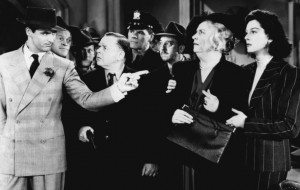President’s Message
By Jerry Zezima
President
National Society of Newspaper Columnists

Jerry Zezima
Now that 2016 is here, and we have all recovered from New Year’s Eve, which means we are ready to repeat the conviviality in the hospitality suite at the NSNC conference in Los Angeles in June, I would like you to consider the year’s most nostalgic journalistic word:
Rosebud.
That was the last word uttered by dying newspaper publisher Charles Foster Kane in the 1941 film classic Citizen Kane, which celebrates its 75th anniversary this year.
Orson Welles, then a 25-year-old wunderkind who wrote and directed the picture, and starred as Kane, turned his first big-screen effort into a cinematic masterpiece, widely considered one of the greatest films of all time and certainly the most influential newspaper movie ever made.
I won’t spoil things by revealing what Rosebud meant. I’ll leave that for the end. Until then, in keeping with the “Hooray for Hollywood!” theme of this year’s conference, let’s take a look at some other newspaper movies that either are celebrating milestones in 2016 or are really good and worthy of remembrance.
The Front Page (1931): At 85, this has been called the granddaddy of all newspaper movies. It stars Pat O’Brien as reporter Hildebrand “Hildy” Johnson and Adolphe Menjou as editor Walter Burns, who hope to cash in on a big story about an escaped murderer whom they hide in a rolltop desk while rival journalists and the cops try to find him. This early talkie was based on the 1928 Broadway hit by former newspapermen Ben Hecht and Charles MacArthur.
It Happened One Night (1934): Director Frank Capra’s Oscar winner for best picture centers on a newspaper reporter (best actor winner Clark Gable) who tries to get the scoop on a runaway heiress (best actress winner Claudette Colbert).
Mr. Deeds Goes to Town (1936): Capra again hit gold, though not the Oscar kind, with this tale of a Vermont tuba player (Gary Cooper) who comes to the big city, where a newspaper reporter (Jean Arthur) wants to write a fish-out-of-water story about him.

Cary Grant (from left), Frank Jenks, Roscoe Karns, Gene Lockhart, Pat Flaherty, Porter Hall, Alma Kruger & Rosalind Russell in His Girl Friday.
His Girl Friday (1940): This remake of The Front Page stars Rosalind Russell as Hildy Johnson and Cary Grant as Walter Burns (this time they’re a divorced couple) and is actually better than the original. Directed by Howard Hawks, the film is famous for its rapid-fire dialogue, as well as for the double entendres that somehow got past the censors.
Foreign Correspondent (1940): The Alfred Hitchcock thriller about a young American reporter (Joel McCrea) assigned to expose enemy agents in London on the eve of World War II. Humorist Robert Benchley, who wrote some of the dialogue, plays a frequently inebriated reporter.
Woman of the Year (1942): Rival reporters (Spencer Tracy and Katharine Hepburn) fall in love and get married, but their relationship is strained when he begins to resent her hectic lifestyle. The chemistry between the stars is great, not surprising since Tracy and Hepburn were more than friends in real life.
Call Northside 777 (1948): James Stewart stars in the gripping tale, based on a true story, of a Chicago reporter who reopens a 10-year-old murder case.
Crime on Their Hands (1948): In this hilarious short subject, the Three Stooges (Moe Howard, Larry Fine and Shemp Howard) are janitors in a newspaper office who get their big break as reporters by tracking down the stolen Punjab diamond, which Shemp accidentally swallows. And, yes, a gorilla is involved.
Ace in the Hole (1951): Kirk Douglas gives a powerful performance as a former big-city reporter who gets a job on a small New Mexico paper and tries to revive his flagging career by sensationalizing the story of a man trapped in a cave. This highly regarded film is marking its 65th anniversary.
Deadline — U.S.A. (1952): Humphrey Bogart stars as the crusading editor of a failing newspaper who tries to expose a gangster’s evil doings before the paper shuts down.
All the President’s Men (1976): Washington Post reporters Bob Woodward (Robert Redford) and Carl Bernstein (Dustin Hoffman) have to gain the trust of editor Ben Bradlee (Jason Robards, who won an Oscar for best supporting actor) to write about the Watergate scandal. This classic was released 40 years ago.
Absence of Malice (1981): A reporter (Sally Field) writes a series of investigative pieces about a liquor wholesaler (Paul Newman) who is suspected of murder. This year is the movie’s 35th anniversary.
The Paper (1994): Ron Howard directed this comedy-drama about a New York tabloid whose publisher (Robert Duvall) says, “I hate columnists. Why do I have all these columnists? I got political columnists, guest columnists, celebrity columnists. The only thing I don’t have is a dead columnist. That’s the kind I could really use.”
Spotlight (2015): Mark Ruffalo, Michael Keaton and Rachel McAdams star in the true story of Boston Globe journalists who uncover the Catholic Church molestation scandal.
Now, back to Rosebud, which, in Citizen Kane, was the name of the sled Kane had as a boy. The film was a thinly veiled look at the life of William Randolph Hearst, the powerful newspaper publisher who carried on an affair with actress Marion Davies. According to legend, “rosebud” was Hearst’s nickname for a portion of Davies’ anatomy that could not, in 1941, be printed in a family newspaper.
It can’t, in 2016, be printed in this President’s Message, either. Maybe it’s safer to think about the Three Stooges and the Punjab diamond instead.
• • •
Jerry Zezima writes a syndicated humor column for The Stamford Advocate in Connecticut.
• • •
This piece first was published in the January 2016 issue of The Columnist, the monthly membership newsletter of the National Society of Newspaper Columnists.

